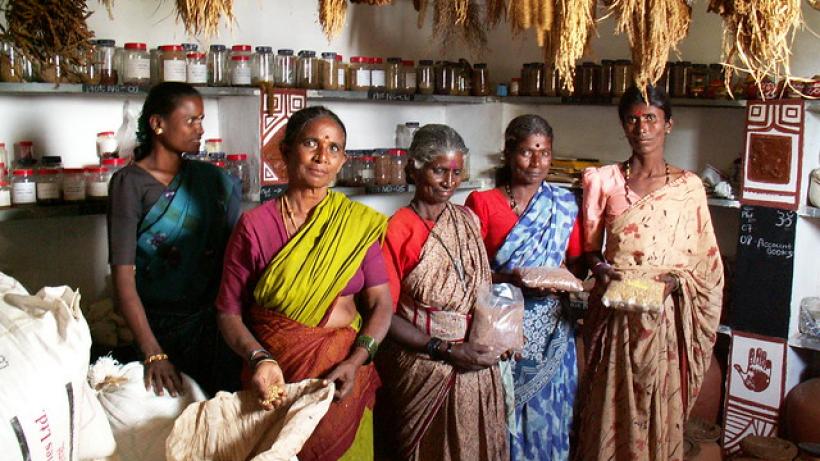
Improving land security through community-based organisations
Researchers and policymakers agree that secure land rights constitute a vital pillar for sustained livelihood improvements among marginalized populations, but existing solutions have been primarily top-down in orientation. Can community-based organisations help to improve land security from the ground up?
Bihar state law guarantees each rural household the right to hold title over a plot of homestead land, yet many Scheduled Caste (SC)[1] households continue to lack title and to suffer from insecure land rights. As such, the land rights sector in Bihar exemplifies a trend that is widespread across large swathes of the developing world: government capacity to deliver entitlements is often weakest where entitlements are most urgently needed. How can governments improve the accessibility of land certification and other social protection entitlements for poor and marginalised populations?
A community-based programme in Bihar, India
In this study, we address a portion of this question through a mixed methods impact evaluation of a community-based programme in Bihar: Deshkal Society’s “Homestead Land Rights in Villages of Gaya District” (referred to henceforth as the Homestead Programme). The term homestead, as used in Indian land-related policy discourse, refers to the land on which a household’s dwelling is located.
The Homestead Programme sought to establish, train, and mobilise village-level community-based organisations (CBOs) of roughly 20 SC individuals each to assist the village’s untitled SC households in obtaining homestead title. CBOs were trained to provide local households with information about homestead land rights, assist them in applying for title, maintain contact with local government officials, and, where necessary, mobilise community pressure toward holding officials accountable for title delivery.
Testing a number of outcomes
The study tested the impacts of the Homestead Programme on nine families of outcomes: 1) perceived land security, 2) dwelling investment, 3) homestead-based livelihood activities, 4) knowledge of government services, 5) use of government services, 6) access to government services (without resorting to bribery or use of a paid government intermediary), 7) assets, 8) food security, and 9) homestead satisfaction. A quantitative survey administered in three waves to ~1,700 households across 144 villages enabled estimation of the Homestead Programme’s impacts on each of these categories.
Meanwhile, qualitative interviews and focus group discussions with dozens of stakeholders and key informants permitted detailed accounts of the ground-level processes associated with the programme and identification of mechanisms through which the programme exerted effects or was constrained from doing so. Specifically, we chose six villages—four treatment and two control—in which to interview SC household representatives, CBO members, local elites, government officials, and other stakeholders. We also interviewed government officials and activists at the block, district, and state-wide level.
Quantitative results
- Strong positive effects on proximate outcomes (CBO formation, title applications, and title receipt), perceived land security, and access to government entitlements (including knowledge of, use of the services, as well as the expectation of being able to access them without a profit-seeking intermediary);
- Moderate positive effects on asset ownership (including stoves, chairs/benches, and savings, although not televisions, pressure cookers, or electric fans) and homestead satisfaction;
- No statistically significant effects on investment or food security.
Qualitative analysis
- While actual instances of full-scale eviction are rare, threats of eviction are widespread, and could be sparked by a variety of potential causes, from a landlord’s decision to sell the land to the government’s decision to widen a highway.
- Impact on investment seems to have been constrained not because insecurity was unimportant in investment calculations, but because cash constraints precluded investment even once land rights had improved.
- Qualitative evidence further revealed inductively the central importance of dalals, or paid intermediaries, in the social protection service delivery process. While many participants had been able to access social protection resources, they could do so only by hiring parties who would often take large cuts of the resources. Among the most important potential roles played by CBOs may be their ability to help marginalised SC households bypass dalals and access the state instead through the CBO’s civic network.
Policy Recommendations
Based on the above findings, we recommend that policymakers take the following suggestions into account:
- Community-based organisations have the potential to institutionalise practical information, political will, and land security.
Our study shows that community-based organisations present a viable alternative model to information campaigns and citizenship training in the social accountability policy domain. Furthermore, the community-based organisation model may work in any of a variety of different sectors.
- Train government officials to engage with civic leaders rather than profit-seeking intermediaries.
The study’s qualitative data showed that government officials were often more accustomed to interacting with dalals—profit-seeking brokers--than they were in interacting with citizens from marginalised social groups. Officials should be trained and supported in interacting directly with citizens, or with legitimate civic representatives. This includes sensitivity training on the power dynamics that may occur within communities (e.g. ostensible representatives of citizens who may be exploiting them).
- Combine attempts to improve land security with resources for investment.
While land insecurity may constrain investment, other factors such as lack of cash may also constrain investment. Attempts to strengthen land rights should be integrated with grants of cash or materials, like the housing improvement programme, Indira Awaas Yojana.
- Information technology and biometrics are not enough.
Researchers and practitioners have increasingly turned to information technology and biometric systems e.g. the Aadhar programme, to improve governance. While these have provided a useful set of tools, data from this project suggest that leakage may continue as long as potential beneficiaries lack a civic channel through which to exert pressure for equitable delivery. While community-based organisations certainly do not constitute a panacea, their potential to organise and empower marginalised communities may help to improve the quality of service delivery and rights protection, regardless of the specific administrative systems and technologies in use.
[1] The term “Scheduled Caste” refers to a legally-designated set of social groups with a history of extreme socioeconomic marginalization, roughly covering the groups historically referred to as “untouchable”.

